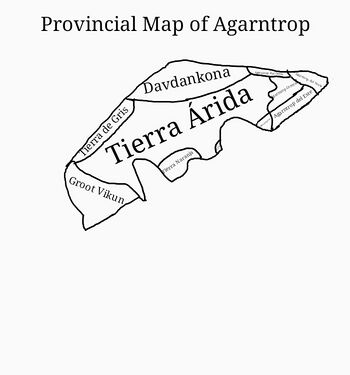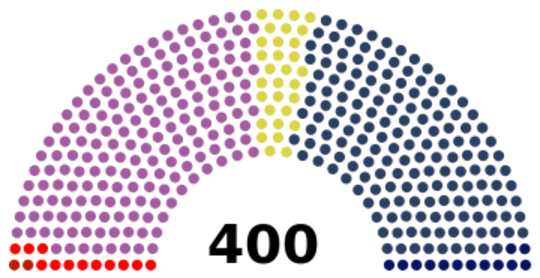Agarntrop
This article is incomplete because it is pending further input from participants, or it is a work-in-progress by one author. Please comment on this article's talk page to share your input, comments and questions. Note: To contribute to this article, you may need to seek help from the author(s) of this page. |
The Federal Republic of Agarntrop Republica Federal de Agarna (Spanish) Federale Republiek van Agarntrop (Agarn) | |
|---|---|
|
Flag | |
| Motto: "Gelykheid en Vryheid" | |
| Anthem: Tierra de los Libres | |
 | |
| Capital and | Agarntrop City |
| Official languages | Spanish and Agarn |
| Ethnic groups | Canter Prybournean (60%), Agarn (30%), Others (10%) |
| Demonym(s) | Agarn |
| Government | Federal Republic |
| Sasini Nanichad (SDP) | |
| Naemi Botha (SP) | |
| Population | |
• 2017 estimate | 27,984,000 |
• Density | 310/km2 (802.9/sq mi) |
| GDP (PPP) | estimate |
• Total | $1,440,067,890,090 |
• Per capita | $48,027.88 |
| Gini (2001) | medium |
| HDI (2017) | very high |
| Currency | Agarn Dollar ($) |
| Driving side | right |
| ISO 3166 code | ARN |
| Internet TLD | .arn |
Agarntrop is a small island nation in Western Valasia. The country was a Canterian colony from 1702 to 1889, when it managed to gain independence due to the ongoing Canter Uprising. Chaos ensued following independence leading to martial law and eventually a military dictatorship under the control of several lieutenant-general-emperors that managed to remain in power until 1966, when a revolt led to the foundation of the modern federal republic.
Ethymology
The name 'Agarntrop' was made by the Canterians in relation to the Agar People who dominated he island from 1345 to 1702.
Language
The most common language in Agarntrop is Spanish, which is spoken by the Canter Prybourneans who make up the majority demographic. Agarn is also common as it is spoken by the indigenous Agarn population, who are also widespread.
The remaining 10% of Agarns speak a variety of languages as their mother tounge, as Agarn immigrants come from many countries around Anteria.
People
The most common ethnic group in Agarntrop are the Spanish-speaking Canter Prybourneans, who make up roughly 60% of the population. The indigenous Agarns are also numerous and make up roughly 30% of the population. The remnant 10% is populated by diverse ethnic groups from across Anteria.
History
First inhabitants
The Five Kingdoms
Medieval era
Aziallan Colonisation
Settler rule
Foundation of the republic
Industrialisation
Involvement in Canter Uprising
20th century
Darning Regime
Civil war
Recovery
Federation act
Government
The Senate
In Agarntrop, there is one national house of legislature, the Senate, which is elected via the Party List System with electors voting for a party rather than a candidate. Then the percentage of votes a party gets will be multiplied by four and the amount of seats the party gets in the Senate will be declared. Members in the Senate are automatically elected every five years with a term limit of 30 years, but the government or just the prime minister themselves may call an election before that time expires. The Senate is currently controlled by a coalition between the ADC and the liberals. This coalition is commonly referred to as the Centre-left coalition.
Executive Branch
The Agarn head of state and government is the Prime Minister, which is elected by the Senate along with the rest of the cabinet. The Prime Minister must form a government with either one party or a group of parties which together meet the required threshold of 201 seats. After this, the cabinet will be almost certainly elected as every party in the Agarn Senate requires their members to vote for their government. The Prime Minister has a term limit of 10 years.
The current Prime Minister is Peter Auklando of the ADC, who was re-elected in 2018 by a vote of 220-171 (with 9 either abstaining or not being present). His term will end at latest on the 10th December 2020, as he will have served for 10 years.
Judicial Branch
The Agarn supreme court consists of 12 seats. In order to ensure impartiality, 6 are appointed by the government and the other 6 are appointed by the official opposition (the largest party not in government). After an election, the supreme court appointments will re-occur, but there is no limit on the amount of times a justice can be reappointed unless the said justice dies or retires.
Culture
Art
Sport
Clothing
Miscellaneous
Trade
Tourism
International Relations
Festivities
| Date | Name | Working day |
|---|---|---|
| January 1st | New Year's Day | Yes |
| The first Sunday after the first Full Moon occurring on or after the vernal equinox. | Easter Sunday | No |
| June 17th | Constitution Day | No |
| October 30th | Liberation Day | Yes |
| December 24th | Christmas Eve | No |
| December 25th | Christmas Day | No |
| December 26th | Boxing Day | No |

